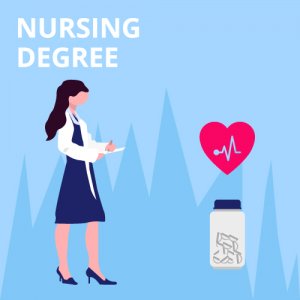What Kind of Accreditation Should My Degree Program Have?
We guess you do not want to waste your time while getting the degree which is not reputable and will not be considered by the employer.
That’s why you must be confident that your school has an appropriate accreditation before you proceed.
And your nursing degree from the accredited university will assure your employer in proper quality of your education.
Accreditation is the approval of the quality of education in the university, college or school by the Department of Education.
The accreditation status of the educational institution is given by specialized organizations.
To obtain the accreditation status, the university has to maintain the standards and requirements of the Department of Education.
As a rule, only that colleges or universities who have got the stamp of approval, are entitled to financial aid from the government.
Moreover, accreditation generally means that the university not only maintains to the educational standards but also continues to develop its competence within a professional field.
When you search for the right university, you have to distinguish between two types of accreditation: institutional and program accreditation.
Program accreditation proves that only a specific discipline or area of study obtained accrediting approval.
Meanwhile, institutional accreditation means the accreditation is given to the educational institution in general.
The status is given by the regional accrediting agencies among which are some of the named below:
- New England Association of Schools and Colleges
- Middle States Commission on Higher Education
- Southern Association of Colleges and Schools Commission on Colleges
- The Higher Learning Commission
- Northwest Commission on Colleges and Universities
- Western Association of Schools and Colleges
Accrediting Agencies and Commissions
The Commission on Collegiate Nursing Education (CCNE) gives accreditation only to master’s and bachelor’s degree programs.
The CCNE was founded by the American Association of Colleges of Nurses (AACN).
The Accreditation Commission for Education in Nursing (ACEN) gives accreditation for a wide variety of nursing programs.
ACEN accreditation carries particular value in cases where nursing schools or training programs are administered through hospitals or healthcare systems.
Other nursing accreditation agencies to look for include:
- The American College of Nurse-Midwives Division of Accreditation (ACNM) giving the approval to education programs;
- The Council on Accreditation of Nurse Anesthesia Educational Programs (COA) gives the stamp of approval to nurse anesthesia programs at the certificate, masters and doctoral degrees.
What Kinds of Nursing Degrees Are There?
Associate’s Degree in Nursing (ADN)
The program of an Associate’s Degree in Nursing takes two years to complete.
You can get the associate degree through a hospital-based school of nursing community or online college.
Such a degree will give you an understanding of the basics of nursing.
Also, you will pursue a parallel liberal arts curriculum.
The Courses you will take during the associate degree program:
- Pediatric Nursing
- General Human Anatomy
- Basic Nursing Skills
- Basic Pharmacology
- Emergency Care
- Nutrition
Difference Between ADN and LPN/LVN
AND is different from LPN – Licensed Practice Nurse in a way that LPN will give you a possibility to work.
Sometimes the certificate LPN is also called a licensed vocational nurse (LVN).
LPN takes one or two years of training in a technical school or at trade to complete and opens the door to higher nursing education.
There is no great difference between ADN and the LPN/LVN because both certificates can be a basic point of entry to the university, you only should check the program is properly accreditated.
Bachelor of Nursing Degree (BN or BSN)
The Bachelor of Nursing Degree program takes from three to four years to complete.
This course is considered as the basic education to work as a registered nurse in most healthcare settings.
Your Bachelor’s degree program will focus on topics like cultural, economic and social issues pertinent to healthcare, human development, biology, and psychology; behavioral science theories and many others.
If you want to shorten the duration of your bachelor’s program to a year-and-a-half, then you can decide to get an RN certificate.
Courses you will take while getting the bachelor’s degree:
- Introduction to Sociology
- Community Health
- Health and Culture
- Leadership in Nursing Practice
- Principles of Chemistry
- General Psychology
- Bacteriology Laboratory
- Human Anatomy and Physiology
What’s the Difference Between a BN and a BSN?
The Bachelor of Nursing is orientated on the theoretical and practical aspects of nursing, humanities, and arts.
On the other hand, the Bachelor of Science in Nursing degree program is orientated not only on mentioned disciplines but also dedicates greater opinion to the sciences, including subjects biology, physics, chemistry.
Master’s Degree in Nursing
The target of a Master of Nursing is to prepare you to become an Advanced Practice Nurse (APN).
The Master’s course typically takes two years to complete.
If you have a desire to become aclinical nurse specialist, anesthetist, nurse practitioner or midwife, you should definitely get your master’s degree in nursing.
Master’s degree course will qualify you to be a nurse administrator or a nurse educator
In order to start studying your master’s program, you must have a bachelor’s degree and also be qualified as a registered nurse.
You will take a lot of useful courses among which are:
- Health Care Policy
- Information Systems in Healthcare
- Specialized Track Courses (i.e. anesthetics, midwifery, healthcare administration, etc.)
- Advanced Pharmacology
- Evidence-Based Practice
- Collaborate Healthcare
- Medical Ethics
- Advanced Biochemistry
Ph.D. in Nursing
Ph.D. is a doctoral-level program in nursing and can be obtained on the basis of a master’s degree.
The aim of a Ph.D. degree is researching and contributing to science, and also teaching.
What’s the Difference Between a Ph.D. and a DNP?
First degree, the Ph.D., is typically oriented on those who want to teach or work in a research field.
Meanwhile, the second one, the Doctor of Nursing Practice (DNP), is advisable for specialists who desire to get administrative roles in clinical practice.
What Kind of Licensing or Certification Do You Need?
To practice nursing business you have to get the license from the National Council of State Boards of Nursing.
In order to get the license, you will need to pass the Licensure Examination.
For passing the test, you need to register in a local office near you.
Firstly, you need to submit an application for an exam to the board of nursing in your area.
Secondly, you are required to register through the company that administers the exam, Pearson VUE.
There are also other nursing licenses, among which the Medication Aide Certification Examination (MACE)and the National Nurse Aide Assessment Program (NNAAP) are.
Popular Degree Programs
What Can You Do With This Degree?
To find a job in a reputable healthcare setting you need to be a bachelor or a master of nursing.
The level of education and the areas of expertise will definitely have an impact on the opportunities ahead.
After you get a nursing degree, you will get a chance to get numerous opportunities and offers.
Below you will see the non-exhaustive list of professions you can apply for, however, some of them need only the advanced – master’s nursing degree.
- Cardiovascular/Vascular Technologists/Technicians
- Diagnostic Medical Sonographers
- Medical Transcriptionist
- Nursing Aide/Attendant
- Physician’s Attendant
- Psychiatric Aide/Technician
- Licensed Vocational Nurse (LVN)
- Medical and Clinical Lab Tech
- Medical and Health Services Manager
- Medical Assistant
- EMTs and Paramedics
- Home Health/Personal Care Aids
- Licensed Practical Nurses (LPN)
- Medical Records/Health Information Tech
- Radiation Therapist
- Radiologic Technologist
- Registered Nurse
How Much Can You Make With This Degree?
Your nursing salary depends on the area of your expertise, your experience, and skills.
According to the Bureau of Labor Statistics, you can see the average salaries per year in some nursing positions you can take after completing your nursing degree:
- Licensed Practical/Vocational Nurse: $44,090
- Nursing Assistants and Orderlies: $26.590
- Registered Nurse: $68,450
- Medical and Health Services Managers: $96,540
- Nurse Anesthetists, Midwives, and Practitioners: $107,460
What Professional Associations or Societies Should You Join?
One of the most common ways to make connections in your professional area, listen to valuable seminars or get reputable certifications, is joining the professional association or society.
We will tell you about some of the most reputable of them.
The American Nurses Association is among the largest professional nursing community.
Membership in ANA will provide you with access to a big library of journals, researches and magazines, and also with the acquaintance with your colleges.
The American Red Cross is a large association which provides nurses with the opportunity to participate in practices by holding public health seminars.
The ARC also teaches nurses and civilians the life-saving skills, to participate in first-response emergency care or other civic activities.
For nursing students, there is a valuable association called The National Student Nurses Association.
This community gives access to educational journals, holds meetings, and provides leadership skill-building programs.
Summary
So, now you have learned the main aspects of getting a degree in nursing.
We hope that our article was useful and gave you a better understanding of the issue.
We are also wishing you good luck in all your beginnings.
See More Degrees
What can you do with a degree in...







